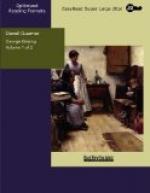“Have you read Mr. Gladstone’s address to the electors of Midlothian?” Serena began by asking, with a roguish look.
“Pooh! What is such stuff to me?”
“I knew I should tease you. What do you think of Mr. Quarrier’s chances?”
“Oh, he will be elected, no doubt.”
Glazzard spoke absently, his eyes on Serena’s face, but seemingly not conscious of her expression.
“I hope he will,” she rejoined.
“What!—you hope so?”
“Yes, I do. I am convinced he is the right man. I agree with his principles. Henceforth I am a Radical.”
Glazzard laughed mockingly, and Serena joined, but not in the same tone.
“I like him,” she pursued, with a certain odd persistence. “If I could do it decently, I would canvass for him. He is a manly man and means what he says. I like his wife, too—she is very sweet.”
He glanced at her and pursed his lips.
“I am sure,” added Serena, “you like me to praise such good friends of yours?”
“Certainly.”
They were in the room where the grand piano stood, for Mrs. Mumbray had gone to pass the day with friends at a distance. Serena said of a sudden:
“Will you please play me something—some serious piece—one of the best you know?”
“You mean it?”
“I do. I want to hear you play a really noble piece. You won’t refuse.”
He eyed her in a puzzled way, but smiled, and sat down to the instrument. His choice was from Beethoven. As he played, Serena stood in an attitude of profound attention. When the music ceased, she went up to him and held out her hand.
“Thank you, Eustace. I don’t think many people can play like that.”
“No; not very many,” he replied quietly, and thereupon kissed her fingers.
He went to the window and looked out into the chill, damp garden.
“Serena, have you any idea what Sicily is like at this time of year?”
“A faint imagination. Very lovely, no doubt.”
“I want to go there.”
“Do you?” she answered, carelessly, and added in lower tones, “So do I.”
“There’s no reason why you shouldn’t. Marry me next week, and we will go straight to Messina.”
“I will marry you in a fortnight from to-day,” said Serena, in quivering voice.
“You will?”
Glazzard walked back to Highmead with a countenance which alternated curiously between smiling and lowering. The smile was not agreeable, and the dark look showed his face at its worst. He was completely absorbed in thought, and when some one stopped full in front of him with jocose accost, he gave a start of alarm.
“I should be afraid of lamp-posts,” said Quarrier, “if I had that somnambulistic habit. Why haven’t you looked in lately? Men of infinite leisure must wait upon the busy.”
“My leisure, thank the destinies!” replied Glazzard, “will very soon be spent out of hearing of election tumult.”




